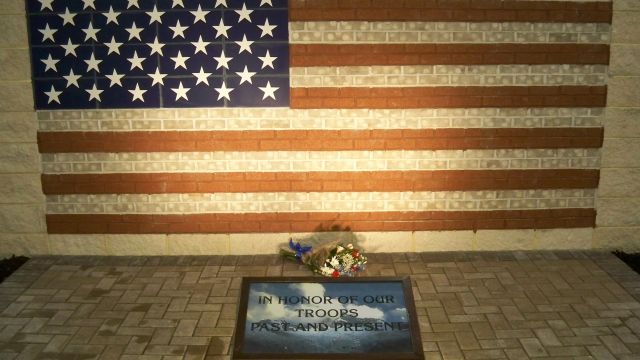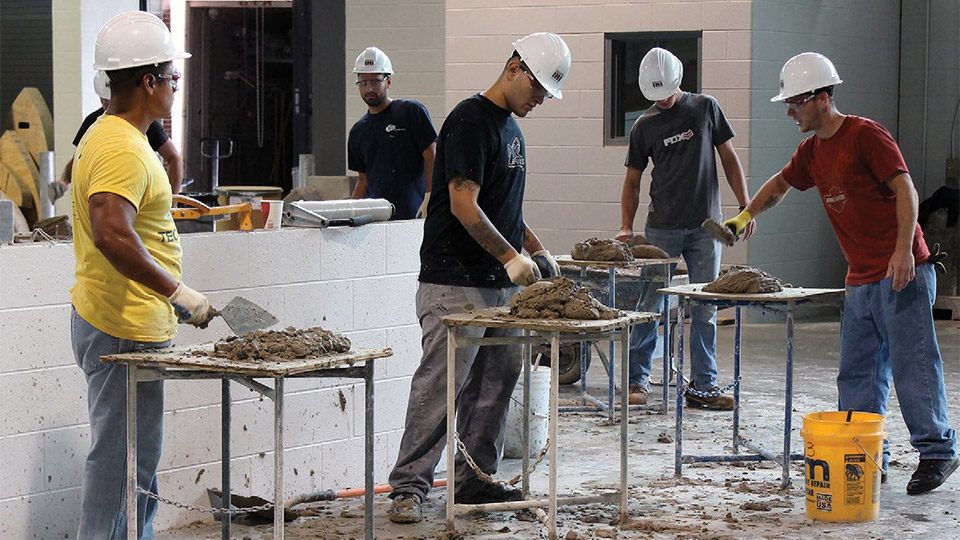Masonry industry workforce development efforts
Education and workforce development
After a very prolonged recession that some have referred to as the Great Recession, the construction industry, in general, has had to deal with a different issue: not having enough well-qualified tradesmen to complete all the work they would like to bid on. Masonry is not an exception to this. As I travel the country visiting chapters, the common comment I hear is, “I could use 30, 40 or even 100 more bricklayers for work I want to get.”
That problem is so much better than the alternative, but still is an issue our industry has to deal with in order to maintain the spike in construction and market share. The reality is that every construction sector is scrambling to ramp up to full strength again, and it is exciting to see how innovative and creative the masonry industry can be in our effort to address the issue.
In the following reports, we are looking to share stories of programs that have been developed around the country to help address these needs. The people who have developed these answers to the issue are no different than anyone reading this. They see an issue, likely experience it, now have done something about it in their region of the country, and have seen success with their programs.
As an industry, we can unify and change lives as many in these regions already have by recruiting men and woman who have no experience in our industry, but are welcomed in and given tools from Day 1 to begin the process of learning a craft that can become a lifelong career. From AZ’s crash course in becoming a tender, to high school programs such as Curtis Hoover’s fantastic program in MD, to the creative partnership in TX between industry and university, the solutions are endless. We just have to set our minds to accomplishing them.
Recently, the MCAA Legislative Committee leadership met in D.C. to discuss our goals for the next few years. One of our priorities will be to re-focus our legislative efforts to attempt to use the Federal government to help promote and support the development of vocational programs around the country. We are planning to model several programs and show success from them – real people whose lives have been changed by being introduced to the world of construction and, in our case, masonry.
I hear regularly wonderful stories of young men and women who never quite fit into the school and college path that young people are shoved into throughout school. The stories about how they did not care for class room instruction, it just never clicked, was not their interest, and the label our society placed on them as being failures or troubled kids is nearly criminal. Many of them will tell the story of how a trade helped them find their places in life, they could identify with it, and, most important, they loved doing it. That experience, if caught early enough at the high school level, can change a young person’s life dramatically.
Another major component of our committee’s task and goal will be to change the perceptions of the public and parents’ opinions of the trades. Trades are not an alternate for people who can’t handle college or high school. They are a fit for people who enjoy using their hands, and enjoy creating and building marvels. A career in the trades can lead to so many wonderful opportunities and success stories and has built a tremendous amount of successful individuals who love what they do and are true assets to their communities.
We will be working to show the reality. We will ask other trades to join us and will ask for a fair shake from the folks who helped diminish the respect and admiration of trades (by stressing the only way to succeed in life was college) – our school systems. Changing attitudes of the parents will be a critical goal in successfully addressing workforce issues.
I hope you enjoy reading the short articles of what is happening. If you have any questions about any of the programs or would like to contact the people running those programs, please feel free to reach out to the MCAA office.
Center of Applied Technology North (CATN)
The masonry program at the Center of Applied Technology North (CATN) is part of the Magnet Program in Anne Arundel County, Md. Students attend CATN as a part of their regular school day. Our magnet programs offer rigorous, student-centered environments. CATN provides an environment where students can apply theory and knowledge toward skills proficiency with hands-on, real-world experiences. We draw our students from seven different high schools in the northern end of our county. We have 22 different programs for grades nine through 12, with some 1,500 students registered to attend.Masonry at CATN is a NCCER Certified Program. In this program, the technical principles and application techniques required for a career in masonry are presented. In their three semesters in the masonry program, which includes 116 hours in Level 1 and 420 hours for Level 2, students gain experience estimating quantity and cost of materials needed, reading blueprints, and designing and laying out projects. They practice skills needed for installing brick, block, stone and concrete.
The teachers working here at CATN are all professionals in their trade areas as are our business partners. For the 23 years that Curtis Hoover, former student (1974) and current teacher of the masonry program, has been teaching at CATN, he has only had to purchase his materials once, in his first year. With the exception of a few tons of sand and practice mortar, CATN business partners have provided all types of materials, brick, block, stone, precast and more. Many of the business partners went through this program and are now successful masons, foremen and owners. In addition to their generosity with materials, many of our partners are also generous with their time. They come in to the classroom and speak to the students about their experiences and businesses, and also lend a hand with the SkillsUSA competitions.
All of our students leave with some kind of certification. The masonry students leave with NCCER Core and Masonry I certifications.
For more information about the Center of Applied Technology North (CATN), contact Curtis Hoover or visit www.catnorth.org.
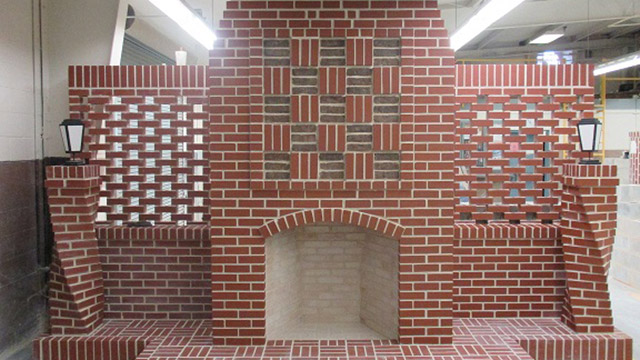
Florida Masonry Apprentice and Educational Foundation (FMAEF)
The Florida economy has begun to recover, and the Florida Masonry Apprentice and Educational Foundation (FMAEF) and the Masonry Association of Florida are working diligently to get their apprenticeship programs back to full speed. FMAEF sponsors more than 130 high schools and technical colleges in Florida. These schools are certified to teach the National Center for Construction Education and Research (NCCER) Construction Curriculums to more than 5,000 students.FMAEF is using the NCCER Construction High School Sponsorship program to prepare Florida students to become more highly skilled entry-level workers. Not only do they possess better hands-on skills, they also are also educated in the soft skills needed to keep a job, once hired.
The Florida legislature has helped the construction industries in Florida by passing the CAPE Fund Act. This act established a source for the Department of Education Career and Technical Programs in Florida to gain additional dollars if certain requirements are met. A student must obtain an industry credential from a course taught by a certified instructor using an industry-recognized curriculum and have an approved industry sponsor. The Cape-funded schools in Florida are beginning to see positive results with students using the NCCER construction curriculums.
During the Great Recession, the FMAEF started looking for additional sources to produce a skilled workforce ready to go to work when the economy turned around. The FMAEF began to work more closely with the Department of Corrections (DOC). There are eight masonry training programs in the Florida DOC. The FMAEF and the DOC held a Masonry Workshop at Baker Correctional Institute in September 2015.Twelve mason contractors and suppliers attended the event. They met with DOC administrators and staff to discuss expanding the opportunities for inmates to obtain a viable trade, in order to be ready to enter the workforce once they complete their sentence. The highlight of the workshop occurred when the contractors and suppliers got to meet the inmates in the masonry classroom and lab. The inmates had the opportunity to show off their masonry skills and have one-on-one conversations about what they need to do to become masons. Following this workshop, the newly formed Florida Concrete Masonry Education Council began working with the FMAEF and the DOC as partners to obtain both federal and CareerSource grants to expand masonry training within the Department of Corrections.
In order to better benefit the students from the Florida schools and the young men and women coming out of the Department of Corrections and Regional CareerSource programs, the FMAEF and Masonry Association of Florida worked with the Department of Education Apprenticeship Division to establish a Hybrid Apprenticeship Program. This program is 4,500 to 6,000 hours long. If a prospective new apprentice has an NCCER Industry Credential and has successfully completed a CareerSource 12-week training program, sponsored by the local apprenticeship program, that apprentice becomes eligible for a credit of up to1,500 hours of previous experience.
The Florida Concrete Masonry Education Council, the Florida Masonry Association of Florida and the Florida Masonry Apprenticeship and Educational Foundation are proud of what we have accomplished so far and will continue to work very hard to grow our masonry workforce.
For more information about the Florida Masonry Apprentice and Educational Foundation, contact Al Herndon or visit www.masonryeducation.org.
The International Union of Bricklayers and Allied Craftworkers (BAC)
As the need for skilled bricklayers grows throughout the United States, training has become a critical issue for the masonry industry. The International Union of Bricklayers and Allied Craftworkers (BAC) has been able to respond effectively to this demand through its national training center and system of more than 60 local training centers that provide training, certifications and continuing education programs to members throughout their careers.Many BAC members begin as apprentices through their local Joint Apprenticeship and Training Committee (JATC), where local unions and signatory contractors plan together to meet workforce needs. In most cases, new apprentices are first prepared through full-time, pre-job training programs. Along with craft-specific technical and hands-on training, they learn about health, safety and workplace skills. When apprentices complete the eight-week program, they are ready to be employed and make a real contribution on the jobsite. During the next several years that follow, apprentices receive classroom, shop and on-the-job-training to ensure that they continue to become proficient at their trade. While the number of BAC apprentices dipped during the recession, many local unions have recently accepted apprentices for training in groups ranging from 20 to 60.
The International Masonry Institute (IMI), a labor-management organization created by the members of BAC and the contractors who employ them, funds much of this training through a grant to the International Masonry Training and Education Foundation (IMTEF). In addition to supporting activities at local training centers, IMTEF operates the BAC/IMI International Training Center in Bowie, Md. At this facility, advanced certification programs and train-the-trainer courses are offered free of charge to qualified members, with travel and lodging costs also covered.
Occupational Safety and Health Administration (OSHA) courses ranging from the initial OSHA 10-hour to specialized confined space and hazardous waste programs are conducted by IMTEF’s master safety trainers at the International Training Center. Local unions also offer numerous OSHA certifications at their training centers and are capable of meeting any specific jobsite requirements.
IMI offers popular certifications or upgraded training in grout and reinforced masonry, rain screens, and air barrier installation, among many others. The Historic Masonry Preservation Certificate program received the American Architectural Foundation’s 2014 Oculus Award. This program helps union restoration contractors secure work by demonstrating the superior qualifications of their workforce.
Through IMTEF’s Instructor Certification Program, BAC instructors learn how to structure a training program that meets the needs of members throughout their working lives. Instructors are also updated on the latest technical and industry information, ranging from new building products and systems to changes in health and safety regulations. More than 600 instructors have attended the Instructor Certification Program, bringing these best practices back to their local unions throughout the country.
Innovation in the construction industry presents both challenges and opportunities for new training programs. The growing use of Building Information Modeling (BIM) and high-tech devices on the jobsite requires bricklayers to become comfortable with an entirely new set of tools, and the training curriculum has been adjusted to reflect that. Within the BAC training structure, technology like IMTEF’s Training Management System allows JATCs to track every member’s training history and easily determine what programs should be offered. It even allows members (and contractors, through their own portals) to view important information like current OSHA certifications on their smartphones.
For more information about the International Union of Bricklayers and Allied Craftworkers, visit www.bacweb.org.
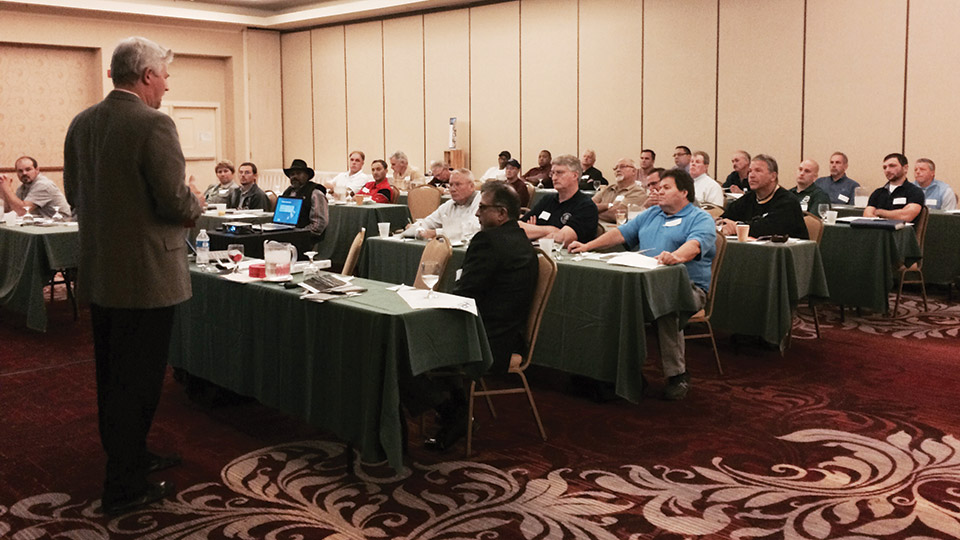
Pennsylvania Concrete Masonry Association (PCMA)
Recognizing the need for a trained, skilled mason workforce, the Pennsylvania Concrete Masonry Association (PCMA) has focused on workforce development for almost 20 years. This effort includes a connection with not only the 40 secondary and three post-secondary votech schools with masonry programs, but also liaisons with the Pennsylvania Department of Education.Specifically PCMA provides assistance for student recruitment with promotional materials and personnel to visit the schools; encouragement, recognition and awards in the form of a tool bag and level, given annually to each school for presentation to the top masonry student; Masonry magazine is provided to each school for industry information and to facilitate reading requirements that must be met by students for graduation; advocacy with votech school administrators to maintain and increase masonry curriculums in the vocational technical schools; and SkillsUSA Pennsylvania competition assistance and awards for the statewide winners.
The most important initiative is the annual full-day Masonry Instructors Workshop, which is in its 11th year. The PCMA provides seminars on topics of interest to the instructors as well as the latest information in the industry. A Pennsylvania Department of Education (PDE) representative also attends to provide information the instructors need to know regarding their curriculum and also allow the instructors to voice concerns to PDE.
As this workshop provided a vehicle for the instructors to meet each other and interact, PCMA developed for them the Masonry Instructors Association of PA, which runs as an autonomous committee of PCMA. This gives the instructors a voice with PDE and others to advocate for curriculum content, testing and more, while providing a way to communicate regularly with each other on a variety of topics.
In 2013, PCMA assimilated the Maryland; Washington, D.C.; and Northern Virginia areas into the association as a standalone committee of PCMA, dba Mid-Atlantic Masonry Association (MAMA). At this time, the instructors from these areas were invited to attend the annual workshop and, subsequently, joined the instructors association, which facilitated the name change to the Masonry Instructors Association.
For more information about the Pennsylvania Concrete Masonry Association, contact Jan Boyer or visit pacma.com.
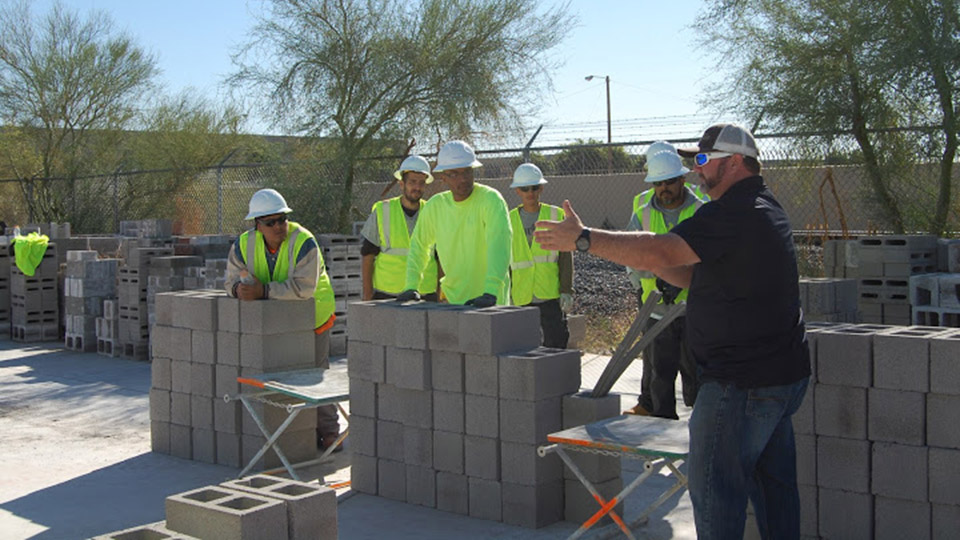
Arizona Masonry Guild
The Arizona Masonry Contractors Association (AMCA) and the Arizona Masonry Guild (AMG) have developed the Tender Training Program, a six-day training program that is targeted to people are looking to enter into our industry but have no formal masonry experience. It is important to note that trainees are not paid for their time in the six-day training program. AMCA and AMG underwrite the cost of the entire training program.The Tender Training Program was specifically designed to focus on four skill areas: mortar mixing and tempering; stocking masonry materials and accessories; building scaffold; and jobsite safety (OSHA 10 course). The 48-hour training program focuses on a few skills and provides plenty of opportunities for trainees to practice these skills throughout the week.
Participants spend about 75 percent of the time practicing mixing, stocking and building scaffold. Various stations are setup throughout the lab area. Trainees work in teams of three and rotate through the stations multiple times throughout a day. Member volunteers observe the trainees to ensure they are being safe, but they also evaluate whether the groups are working together effectively as a team and communicating with each other on how they are planning to complete each task.
Graduates enjoy the opportunity to meet members of the industry, especially mason contractors who plan to hired graduates of the program. Many of these contractors share their stories on how they got started in the industry and stories from their days as tenders. This really hits home with a lot of our trainees and really illustrates the great opportunities that are available in our industry.
The Tender Combine is held on the last day of the hands-on training, during which contractor members interested in hiring a graduate can see the candidates in action. The trainees working again in small teams are timed as they rotate through the mixing, stocking and scaffold stations. At the conclusion of the combine, a draft is held, and mason contractors have an opportunity to select the candidates they would like to hire. Mason contractors are then allowed time to present their job offers to each candidate.
In the June and November sessions, all graduates of the program were hired by mason contractor members.
A significant success story comes from the November training session, when a graduate who was a U.S. veteran living in a homeless shelter entered the training program. He was one of the top performers during the program and was hired by a member. He has moved out of the homeless shelter and is excited about learning more about masonry construction. He now has his sights set on applying for an apprenticeship program in 2017. The Tender Training Program is not only a great tool for recruiting new talent into the industry, but also the pipeline to continue the growth of the apprenticeship program and produce the craftsman needed to sustain and build the industry in the future.
For more information about the Arizona Masonry Guild, Inc., contact Lisa Prichard or visit www.masonryforlife.com.

Texas Masonry Council (TMC)
In 2015, the Texas Masonry Council (TMC) and University of Texas at Arlington - Division for Enterprise Development (UTA-DED) launched the first-ever accelerated masonry training certification program. The program materialized when members of the TMC and UTA sought to address the shortage of masonry workers in the Texas. Resources from the university’s division of enterprise development and more than 20 masonry manufacturers and construction companies were pooled to launch two masonry schools in the Houston and Dallas regions.The partnership between the TMC and UTA-DED offers a masonry training certification program in Houston and Dallas regions that provides Level 1 training. The program is designed to fit months of education and training in one eight-week session. Classes run eight hours per day, five days per week. The students leave the program with a 10-hour OSHA certification card and training in brick and CMU construction.
The TMC/UTA-DED partnership prides itself on recruiting, marketing and promoting the program to hundreds of schools and independent school districts across the state. This is the first-ever comprehensive, hands-on training in Texas in an indoor warehouse facility combined with classroom instruction (in both English and Spanish). The undeniable advantage of the program is that its participants are quickly prepared to leave with the ability to go out and obtain good-paying jobs. Future plans to expand in to the Austin and San Antonio markets.
For more information about the Texas Masonry Council, contact Lindsey Stringer or visit www.texasmasonrycouncil.org.
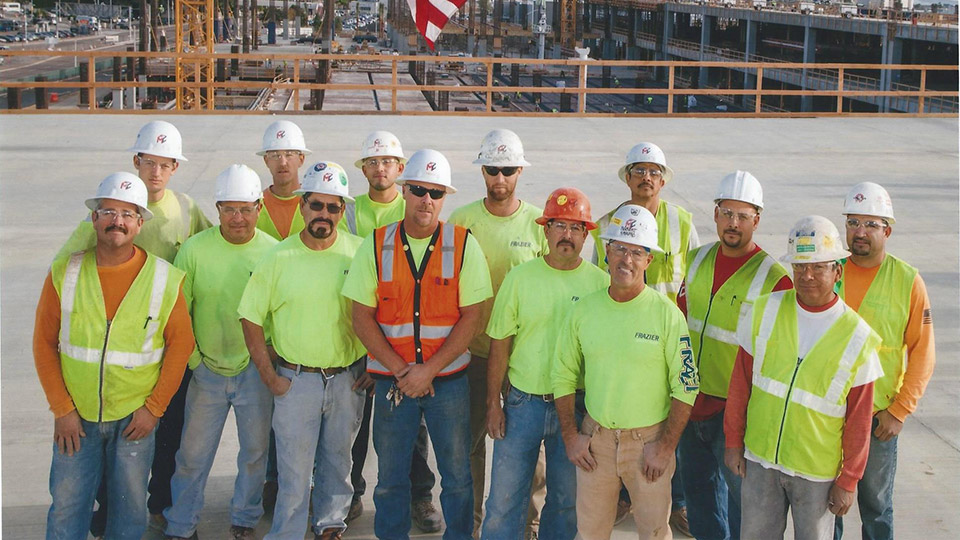
Masonry Industry Training Association (MITA)
The Masonry Industry Training Association (MITA) aims to promote masonry, training and recruiting, and apprentice younger skilled talent toward jobs and careers in masonry. MITA teams up with high schools, continuation high schools, boys homes, adult schools, regional occupational programs, and workforce innovation opportunity act Title I youth program services (WIOA) to promote and teach masonry to as many young people as possible as a pathway to a career. MITA is a bricklayer/mason apprenticeship program approved by the State of California DIR CAC DAS, and Federal DOL.One can only become a brickmason/blockmason through apprenticeship. MITA’s apprenticeship takes 3.6 years. With MITA, contractors benefit with motivated pre-apprentice and apprentice employees. Suppliers and vendors benefit with craftsmen who are better skilled to install their products. All MITA members benefit by being in compliance with public works, California Labor Code Section 1777.5, and requests for dispatch of apprentices in ratio to journeyworkers.
For the first time ever in the 16-year history of the Top Notch Trowel competition, an all girls team won the annual Jim Broncatello Perpetual Trophy. At the California Regionals Fastest Trowel, held simultaneously with California Regionals Apprentice Skills Challenge, high school masonry students take part in their own Most Accurate Trowel competition. California’s Fastest Trowel winner, heading to WOC again, is one of MITA’s first apprentices.
For more information about the Masonry Industry Training Association, contact Lyn Oleson or visit trainmason.org.
About the Author
Jeff Buczkiewicz is the President and CEO of the Mason Contractors Association of America. Jeff has worked in the masonry industry for several years as the Executive Vice President of the Building Stone Institute and the Director of Marketing and Membership for the Mason Contractors Association of America. Jeff has also served as Secretary on the Board of the Natural Stone Council and is a former Board Member of the StonExpo Federation.











